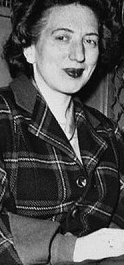
Miriam Moskowitz brought the legal action in Manhattan federal court seeking to vacate her 1950 conviction on charges she conspired with two men to lie to a grand jury investigating allegations of atomic espionage. She was sentenced to two years in prison.
In court papers, Moskowitz said she was working on a book about her case in 2010 when she spotted conflicts between the trial testimony of a former colleague who testified against her and statements he made to the FBI that were read to the grand jury. She said she learned in March that she could ask the court to vacate her conviction.
"The effects of my conviction have had, and continue to have, profound effects on my life," the of Washington Township, New Jersey woman said. "For decades after my incarceration, I felt I had to avoid attention and keep a low social profile with new friends, and experienced shame in certain interactions within the community."
Moskowitz noted, for example, that the rabbi at her synagogue once gave a damning sermon about atomic espionage on the eve of Yom Kippur, and shunned her when she approached him after the service.
"The entire course of my life has been affected by my felony conviction," she said. "I never married or had children, in part because, for decades after my conviction, I found it painful to reveal my past. After my release from prison, FBI agents repeatedly harassed me at my workplace, making it impossible for me to keep a job."
In court papers, Moskowitz's lawyers say they learned that the government withheld critical evidence for nearly 60 years when a federal judge in 2008 ordered the release of key secret grand jury testimony in the Rosenberg spy trial. The lawyers say FBI and grand jury statements made by Harry Gold — the key government witness against her — were withheld from the defense.
The Rosenbergs were convicted of passing nuclear weapons secrets to the Soviet Union and were executed in 1953. Since then, decoded Soviet cables have appeared to confirm that Julius Rosenberg was a spy, but doubts have remained about Ethel Rosenberg's involvement.
In 1947, Abraham Brothman and his associate, Gold, were questioned by the FBI about allegations they were involved in atomic espionage, the court papers said. Moskowitz then worked as Brothman's secretary and was having an affair with him, the papers said.
Moskowitz's lawyers say Gold repeatedly told the FBI that Moskowitz was unaware of Gold and Brothman's plan to lie before the grand jury until the government threatened him with the death penalty. They say he then cooperated and testified against Moskowitz at trial, saying she was there when they discussed their perjury plans.
The papers also say the jury would have been undeniably affected by Cold War anti-Communist biases.
A spokesman for government lawyers did not immediately comment.